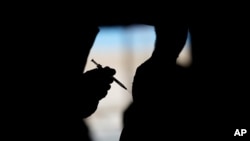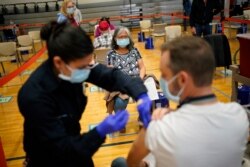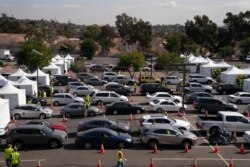As vaccination efforts ramp up in the United States, experts say efforts to deal with doubters need to increase along with them.
Some are predicting that as soon as April, there may be more vaccines available than people who want to take them.
A recent Kaiser Family Foundation poll in January found that just under half of Americans said they want to be vaccinated as soon as possible or have already gotten their shots. Another one-third said they would "wait and see" how the vaccine works for other people before taking it themselves.
That leaves about 20% who say they definitely will not get it or will do so only if required.
According to some estimates, 80% to 85% of the population needs to be vaccinated in order to reach the point known as herd immunity, when enough people are protected from the disease that the virus can't find new people to infect.
"Right now, there are enough people that are saying that they absolutely will not get (the vaccine), that we wouldn't be able to reach" herd immunity, said Texas State University anthropology professor Emily Brunson, co-chair of an expert group on vaccine equity.
The good news is, confidence is increasing. In December, about a quarter of people said they definitely would not get vaccinated or would only if they had to.
Experts say confidence will likely continue to increase as more people get their shots with no ill effects.
"I'm hearing so much more of, 'I want to know more, I'm thinking about it,' than, 'No way,'" said Johns Hopkins University pediatrician Sarah Polk. "I am not panicked at this point."
Polk is co-founder and co-director of Centro SOL, a health outreach organization targeting the growing Hispanic population in Baltimore.
Polls have found Hispanics and African Americans less eager than whites to get vaccinated. Experts say that is largely due to long-standing discrimination and a lack of access to health services.
Trusted messengers
One of the best ways to reach doubters is through what social scientists call trusted messengers. They could be celebrities or politicians, but often they are respected members of the local community.
But finding the right messenger isn't easy.
For example, an organization called Cure Violence could be well-placed to win over skeptics in the largely African American and Latino neighborhoods in which they work, and where vaccine hesitancy runs high.
The group's main mission, as the name suggests, is to prevent violence. Its outreach workers come from low-income neighborhoods in more than 20 cities across the country.
When the pandemic began to spread last March, Cure Violence quickly began training its outreach workers about the disease and how to talk about it in their neighborhoods.
Dealing with a disease outbreak may not have been their original purpose, but "that's the way it goes in epidemics," said Gary Slutkin, the organization’s founder and CEO. "You usually don't have an existing epidemic infrastructure. You have to use something or build something."
Slutkin knows from experience. He worked on fighting cholera, tuberculosis and HIV/AIDS in Africa before adopting disease-control methods to prevent violence.
Cure Violence made videos, social media posts and paper posters about how to live real life with COVID-19 around. Of course, that included masks and social distancing. But for some neighborhoods, it also included warnings about avoiding crowded dice games and sharing joints.
That's why the group is effective, experts say. Workers know the communities in which they work. They understand the concerns. People know them and trust them.
Armed with the right information, they could be powerful advocates for vaccination.
There's just one problem. Many of Cure Violence's outreach workers don't trust the vaccine, either.
"We have the right people, we have the right access, we have the right trust," Slutkin said, "but we're still going through the first stages of having our workers themselves feel comfortable with it."
Slutkin himself is a trusted messenger at Cure Violence. He says a staff member told him it was helpful to know that he took the vaccine.
"Took it?" he replied. "Do you have any idea what efforts I went to?"
He explained that he wanted the vaccine badly enough to go through the messy process of getting an appointment.
Slutkin said they are now recording a conversation between himself and a staffer. "That person would have the questions that the community would have."
The process Cure Violence is having to go through with its own members mirrors what its workers will deal with in their neighborhoods, and what the country as a whole will have to do on a much larger scale.
Reaching the skeptics is "going to take a lot of work and a lot of effort," said Brunson of Texas State University. "There is no silver bullet."
"The vaccine technology is complicated," she added, "but the people that you're trying to convince to take the vaccines (are) even more complicated."


